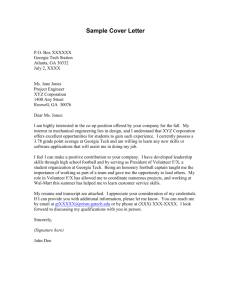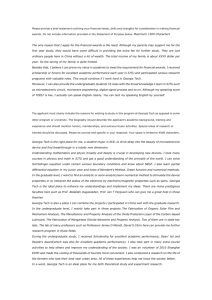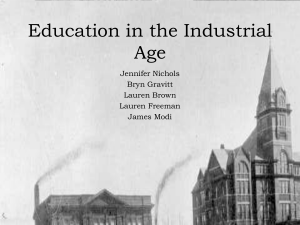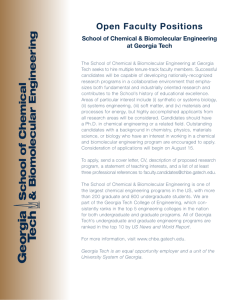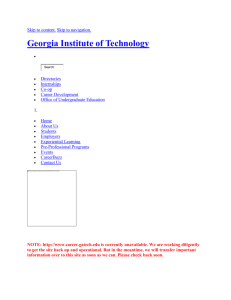spp-2009-10-fac-research - School of Public Policy
advertisement
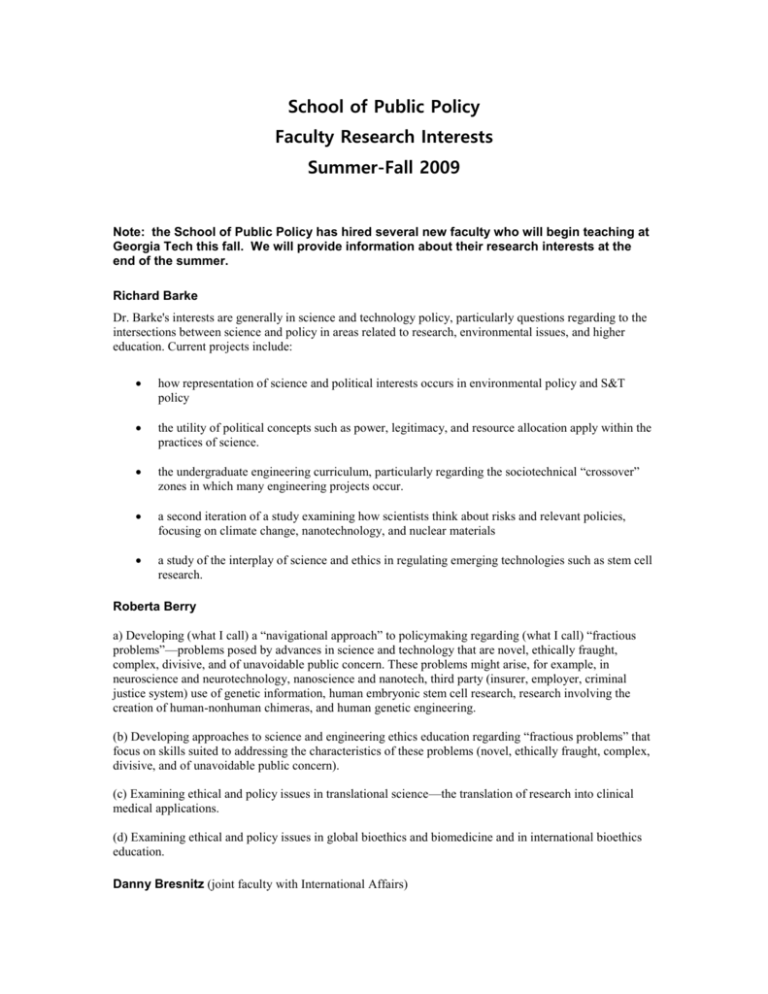
School of Public Policy
Faculty Research Interests
Summer-Fall 2009
Note: the School of Public Policy has hired several new faculty who will begin teaching at
Georgia Tech this fall. We will provide information about their research interests at the
end of the summer.
Richard Barke
Dr. Barke's interests are generally in science and technology policy, particularly questions regarding to the
intersections between science and policy in areas related to research, environmental issues, and higher
education. Current projects include:
how representation of science and political interests occurs in environmental policy and S&T
policy
the utility of political concepts such as power, legitimacy, and resource allocation apply within the
practices of science.
the undergraduate engineering curriculum, particularly regarding the sociotechnical “crossover”
zones in which many engineering projects occur.
a second iteration of a study examining how scientists think about risks and relevant policies,
focusing on climate change, nanotechnology, and nuclear materials
a study of the interplay of science and ethics in regulating emerging technologies such as stem cell
research.
Roberta Berry
a) Developing (what I call) a “navigational approach” to policymaking regarding (what I call) “fractious
problems”—problems posed by advances in science and technology that are novel, ethically fraught,
complex, divisive, and of unavoidable public concern. These problems might arise, for example, in
neuroscience and neurotechnology, nanoscience and nanotech, third party (insurer, employer, criminal
justice system) use of genetic information, human embryonic stem cell research, research involving the
creation of human-nonhuman chimeras, and human genetic engineering.
(b) Developing approaches to science and engineering ethics education regarding “fractious problems” that
focus on skills suited to addressing the characteristics of these problems (novel, ethically fraught, complex,
divisive, and of unavoidable public concern).
(c) Examining ethical and policy issues in translational science—the translation of research into clinical
medical applications.
(d) Examining ethical and policy issues in global bioethics and biomedicine and in international bioethics
education.
Danny Bresnitz (joint faculty with International Affairs)
My areas of interest include:
Rapid innovation-based industrialization, especially science and technology policies and the role
of the state under the constraint of the global economy.
State-society interactions.
Methodological issues regarding social structure and historical based social science research.
Shiri Bresnitz
Dr. Breznitz conducts research in economic development, biotechnology, and university
commercialization:
* A comparative study on the Israeli and Finish biotechnology clusters
* Technology transfer structure at universities
* Comparison of American vs Non American universities on the question of which parameters are required
for commercialization success
* Economic development initiatives at universities - beyond technology transfer - two studies on qualitative
and one quantitative based on a large survey.
Marilyn Brown
My current research focuses on the design and impact of policies aimed at accelerating the development
and deployment of sustainable energy technologies. The Energy Policy Act of 2005 mandates the
development of a report describing the national strategy to promote the deployment and commercialization
of greenhouse gas (GHG) intensity reducing technologies and practices. The U.S. Department of Energy
has asked me to lead the development of this report. Steps in this process include the development of an
inventory of current deployment policies and programs, an inventory of GHG-intensity reducing
technologies suitable for deployment, a literature review on barriers to the commercialization and
deployment process, and interviews with approximately 30 experts.
In late 2006, I was asked to be Vice-Chair of the U.S. Government Review of a draft report developed for
the Intergovernmental Panel on Climate Change titled: “Climate Change 2007: Mitigation of Climate
Change.” Drawing on my interest in climate friendly built environments, I am also one of several
contributing authors from around that world who are preparing the chapter on Mitigation Options for
Residential and Commercial Buildings.
In addition, I continue to work in the field of energy policy scenarios and have developed an energy
sustainability index to measure progress and to develop state and international comparisons that would
allow progress in Georgia (for instance) and the U.S. to be benchmarked against activities in other states
and key economies (Japan, U.K., India, China, etc.).
Finally, as the newly elected Chair of the Board of Directors of the Southeast Energy Efficiency Alliance
(www.seea.us), I am an active participant in the development of policies, programs and initiatives to make
energy efficiency the most important resource to meet the growing energy demand in the Southeast.
Marco Castillo
My research area is behavioral economics. In particular, I study rational non-selfish behavior and social
interactions. I mainly use highly controlled lab experiments to discern among confounding effects, but
recently I am using more naturally occurring experiments, such as catastrophes, wars, and policy
experiments.
Jennifer Clark
Jennifer Clark's research focuses on regional economic development policy, agglomeration economies,
territorial innovation systems, and labor market restructuring and regulation. Dr. Clark teaches courses in
urban and regional economic development theory, analysis, and practice as well as research design. She
also directs the masters of public policy and masters in city planning joint degree program.
She is currently working on a compartive study of regional economies specialized in the photonics industry
in the US, Canada, and Germany. She is also working on research which empirically tests the theorized
relationships between networks of small and large firms within regional economies and the effects of those
networks on broader regional competitiveness.
Susan Cozzens
My current research is on the connections between science and technology policies and inequalities. This
work includes exploration of science and technology policies in the development process as well as
connections with inequalities within countries, in particular by gender and ethnicity. There are many
specific research topics to be explored in this wide-open area, and I expect to be working in it for quite a
while.
Michael Elliott (joint faculty with City Planning)
My research interests include the impact of collaborative and consensus building processes for resolving
environmental and other public policy disputes, the impact of such processes on the quality of
environmental decisions, and the design and evaluation of dispute management systems. Particular projects
include an examination of deliberative democratic processes used in the city of Chattanooga and their effect
on revitalization of the city and an examination of urban development politics and policy on urban design
systems in six cities.
Mary Frank Fox
My research focuses upon the study of women and men in academic and scientific organizations and
occupations.
My research projects are: 1) study of undergraduate programs for women in science and engineering; 2)
study of careers among academics in computer science; 3) study of entrepreneurship and advancement
among academic women in computing; 4) the research program of the NSF ADVANCE initiative, focusing
upon organizational factors that operate among faculty, and provide a a model of best practices, in
academic science and engineering; and 5) the research component of the Women's International Research
Engineering Summit (WIRES), funded by NSF.
Diana Hicks
Current projects in policy for research and innovation:
Data oriented - Can we find super-innovative firms and get an early glimpse of emerging industries
(so we can attract them to Atlanta before others realize what is going on)?
Theory oriented - If people want to give out money pretty equally to everybody, won't this mess up
research (because research is about superstars)? Perhaps prizes are the answer.
Michael Hoffmann
“Everybody takes the limits of his/her own field of vision for the limits of the world" (Arthur
Schopenhauer). In order to overcome those limitations, my research focuses on visualization methods that
are intended to stimulate reflection, creativity, learning, and cognitive change. In recent years, I developed
Logical Argument Mapping (LAM), a method to visualize complex structures of mutually supporting
knowledge claims, beliefs and values. The method can be used to represent scientific controversies; to
structure planning, problem solving, and deliberation processes; to clarify one's own thinking on illstructured problems; and to resolve conflicts that are determined by clashing values, ideas, and world
views.
Gordon Kingsley
My current research projects explore the growing use of public-private partnerships and how this
organizational form influences the management of scientific and technical human capital in service of the
public interest. This work is being conducted in three policy domains examining the following: 1) the
impact of educational partnerships between K-12 schools and institutions of higher education on the
professional development of teachers offering math and science instruction; 2) patterns of outsourcing
professional services among state transportation agencies and the strategies for integrating engineering
work drawn from the public and private sectors; and 3) the development of hybrid organizations and
network organizations designed to channel resources from the public and private sectors to stimulate
technology-led economic development.
Robert Kirkman
My primary research interest is environmental philosophy. On the theoretical side, my project concerns the
phenomenology of moral experience, that is, investigation into the lived experience of making decisions
within particular environmental contexts. I am currently exploring the possibility of what I call theoretical
imagination, that is, the possibility of a moral imagination informed by scientific theory, from Newtonian
mechanics to Darwinian evolution.
To bring all of this into the practical realm, I have for some years been investigating the value judgments
and value conflicts that are in play in debates over metropolitan growth (a.k.a. “sprawl”) in the United
States. I am especially interested in the perspectives of ordinary citizens in American metropolitan areas
and the context within which they make decisions about their own environment and their lives within
it. Currently, I am focused on the problem of constraints on choice and action in the context of the built
environment; I am collaborating on a project to discover such constraints in relation to the Atlanta BeltLine
project.
As an extension of my teaching and service responsibilities, I have also been involved in efforts to
understand how ethics education programs at Georgia Tech can be made more effective, and how it might
be possible to measure their effectiveness. I am currently engaged in a collaborative project to develop and
test assessment instruments for ethics education in science and engineering.
Hans Klein
My current research seeks to explain the surprisingly meager social impact of public, educational, and
governmental access television in terms of their institutional structures. The research seeks insights into
how to design better community media institutions and how to make use of the opportunities presented by
new digital technologies for community activism.
I also continue to work on global Internet governance. My focus is on global public policy and the nature
of legitimacy of global institutions.
1. Community Media Research
This research will examine how local activists use public access television and the Internet to effect social
change.
2. Online Association
This research will design and possibly develop tools by which dispersed individuals can come together and
share experiences for collective learning. It will explore use of email lists and on-line "wikis" (similar to
wikipedia.org)
Cheryl Leggon
Dr. Leggon’s research focuses on human resource issues in science and technology policy—especially
concerning groups that are underrepresented in the science and engineering (S&E) workforce. In the
United States, these groups include: African Americans, Mexican Americans, Native Americans/Native
Pacific Islanders, Puerto Ricans as well non-Hispanic white females. Outside of the United States women’s
underrepresentation in S&E is impacted by the intersection of gender, race, ethnicity, nationality and
immigration status. Current work includes:
Cross-Disciplinary Initiatives for Minority Women Faculty (Co-Principal Investigator). The purpose of
this research-based initiative (funded by the National Science Foundation) is to enhance socialization into
academic engineering. This first phase focuses on 20 untenured women in tenure-track positions on
engineering faculties throughout the United States and Puerto Rico.
The Status of Women in International Chemistry, Computer Science and Mathematics: What we
know and need to know to increase the Advancement of Women. This project seeks to develop and
implement context-specific policies that inform programs and practices to enhance women’s participation
in chemistry, computer science and mathematics; this work is anchored in the research, evaluation and
technical assistance literatures.
Aaron Levine
Dr. Levine’s research interests focus on the intersection between public policy and biomedical research and
his current research focuses on understanding how government policy affects the development and
diffusion of contentious biomedical technologies, such as embryonic stem cell research. Several ongoing
projects may have opportunities for undergraduates who want to take a research course for credit either in
the summer or fall. These include:
Understanding Patient Experiences with Unproven Stem Cell Therapies
An exploratory study of the patients who travel abroad for stem cell “therapies” that have not yet been
proven either safe or effective
Exploring the Regulation, Oversight and Impact of State Stem Cell Programs
This research examines the emergence of stage programs to fund basic stem cell science. In particular it
seeks to identify the differences between the various state programs in their approach to ethical oversight,
peer review and research prioritization.
Path Dependency and the Clinical Translation of Stem Cell Research
This research explores the translation of basic stem cell research to the clinic. Its focus is developing an
understanding of how pharmaceutical firms are reacting to a new technology that may fundamentally alter
the existing drug development business model.
Competition, Innovation and Regulation in the Fertility Industry
This project seeks to assess the effectiveness of self-regulation in the fertility industry. In particular, it aims
to understand the factors that influence compliance with self-regulatory guidelines by fertility clinics, egg
donor agencies and others involved in this industry.
Julia Melkers
My current research is on the role that the structure, resources of the social and professional networks of
scientists (particularly women) have on career outcomes and satisfaction. I am also working on other
projects that address the collaborative patterns and outcomes of science within the research center
environment. The data I am using is a blend of detailed social network and other survey data, together with
other institutional and bibliometric data. While I am unsure about whether I will have funding left to cover
any additional students, I would be interested in having undergraduates join our team in other capacities.
Students would learn about the conduct of survey research in the S&T environment, the integration of
additional data sources with survey data, and analytical approaches to using survey data.
Helena Mitchell (adjunct professor in Center for Advanced Communications Policy)
Dr. Mitchell and her staff create programs and services to stimulate movement into new and advanced
technology areas by institutions of the University System of Georgia and its partners. OTP contributes to
the national dialog on regulatory and technology policy issues. In tandem, she is the Principal Investigator
on several major grants including the National Science Foundation, state agencies, the private sector and
the U.S. Dept. of Education “Rehabilitation Engineering Research Center on Mobile Wireless Technologies
for Persons with Disabilities.” Her areas of specialty include spectrum management, educational
technologies, regulatory and legislative policy, DTV, emergency/public safety communications, and
universal service to rural and vulnerable populations.
Nancy Nersessian (joint faculty with Computing)
Her research focuses on the nature and processes of conceptual innovation and change in science;
specifically, investigating the role of analogical and visual modeling and thought experimenting (simulative
modeling) in conceptual change, both in science and in science education.
Doug Noonan
My research currently includes:
--"Spare the Air" and smog alert programs in cities around the country
--Atlanta's BeltLine Project {surveying residents about the project, city politics and process of the project,
park construction and transit, gentrification}
--Air quality in Atlanta {air quality effects on outdoor activities and driving, impact of smog alerts,
nonmarket valuation of air quality, abatement costs for Atlanta airshed, locational equilibrium models,
inspection and maintenance compliance}.
--Environmental justice {measurement, definition of, and research design; spatial scale effects; EJ of flood
risks in Louisiana; neighborhood dynamics and environmental change; neighborhood dynamics and EZ/EC
cleanup, geographic barriers between residential clusters}.
--Atlanta's Park System {dog parks, park resources around the metro area, who pays for parks? who uses
parks?}
--Energy efficiency in residential heating and air conditioning technologies
--Open source software {international policies, national policies, open source and open standards}
Bryan Norton
In my current research I am working on the problem of spatial and temporal bounding of environmental
problems and the associated problem of how to determine who are "affected and interested parties" so as to
guide choices of both models and organizations to address environmental problems. Whenever someone-scientist, activist, stakeholder, or citizen--attribute a problem to an environmental system, they implicitly or
explicitly "bound" that problem and "model" that problem as involving certain causal and policy factors.
Our present research involves developing a handbook to guide conservation and development
organizations when they face trade-offs between conservation and development goals. At present, I have
no external funding to support undergraduate research.
Georgia Persons
Dr. Persons is doing research on: the implementation of the faith based initiative; how churches define
themselves as organizational types in taking on roles beyond the sacred; and a planned project on Hurricane
Katrina and the constraints on the federal role in emergency preparedness.
Alan Porter (joint faculty with Industrial and Systems Engineering)
Text Mining of Science & Technology (S&T) Information Resources. Pursuing technical intelligence via
these means in support of technology forecasting and assessment. Much of my research applies
VantagePoint software to downloaded search results on particular S&T topics from major research
publication or patent databases (e.g., MEDLINE, Web of Science).
VantagePoint software was developed partly at Georgia Tech. It provides a powerful tool to help analyze
search results (e.g., 1000's of paper or patent abstract records). Our "Tech Mining" approach converts such
analyses into innovation indicators to aid in S&T policy formulation or management. We would like to
explore better ways to represent these analytical results with Geographical Information Systems (GIS).
Juan Rogers
My current research interests include modeling the R&D process, assessment of R&D impacts, especially
in the formation of scientific and technical human capital, technology transfer, R&D policy and evaluation,
the interaction of social and technical factors in the development of information technology, and
information technology policy.
David Sawicki (joint faculty with City and Regional Planning)
My specialties include methods of policy analysis and planning, demographic and economic analysis, and
forecasting. Most of my advisees work on urban policy questions, many with an economic development
focus. However, as Editor of the Journal of the American Planning Association, I am widely read and able
to guide students in quite a number of different research directions.
Philip Shapira
The Georgia Tech Program in Science, Technology and Innovation Policy – A Collaborative Program of
the Georgia Tech School of Public Policy and the Georgia Tech Enterprise Innovation Institute
(http://www.stip.gatech.edu) - offers PURA and other undergraduate research opportunities in innovation
policy and regional innovation systems. Current projects include assessing innovation in mature and
emerging industries, assessing creative knowledge environments in science, and research systems
assessment and mapping in nanotechnology. Individual assignments will be matched with student interests.
Undergrad researchers will receive mentoring, training in analytical and datamining techniques, and
opportunities to be engaged in "hands-on" policy research projects and to work as part of an international
research team based in Technology Square. We are currently interviewing undergrad students, and will
welcome SPP applicants. For further information, contact: Professor Philip Shapira, Georgia Tech School
of Public Policy, Email: pshapira@gatech.edu
Valerie Thomas (joint faculty with Industrial and Systems Engineering)
My research interests are the efficient use of materials and energy, sustainability, industrial ecology,
technology assessment, international security, and science and technology policy. Current research projects
include strategies for increasing reuse and recycling, strategies for reducing use of petroleum, and
development of renewable energy and energy efficiency in Georgia.
John Walsh
Economic sociology of innovation, with an emphasis on comparative policy analyses (US/Japan) and the
roles of universities in national innovation systems. Recent work includes studies of university-industry
linkages in the US and Japan, the effects of research tool patents on biomedical researchers and country and
industry differences in the role of patents in firm strategy.
I am currently interested in undergraduate research assistants who are interested in working on one of my
new surveys on innovation and inventors. In addition to getting practical experience in survey methods and
archival research, they will learn about science, technology and innovation policy in comparative
perspective. I am very much interested in having one or more students, starting soon and working (for
credit or, possibly, pay) this spring and summer (and probably next fall).
